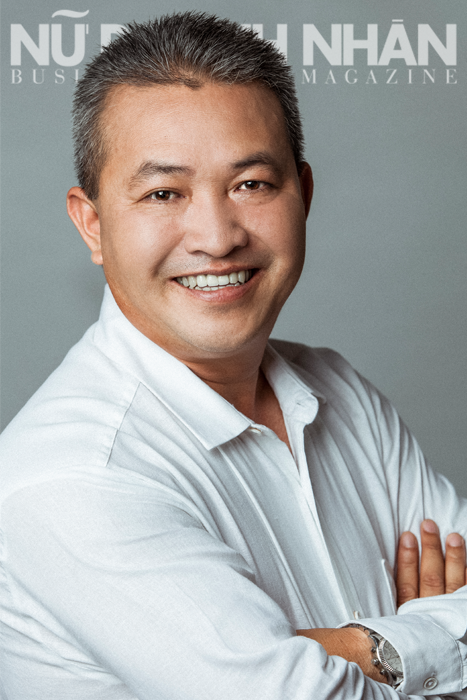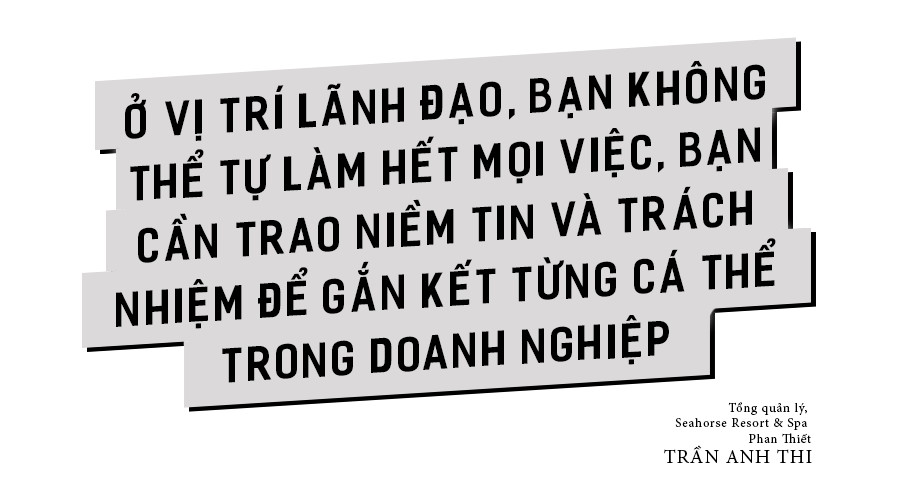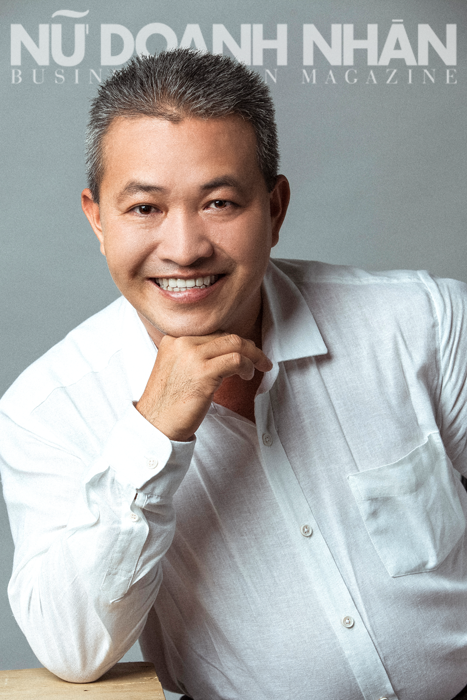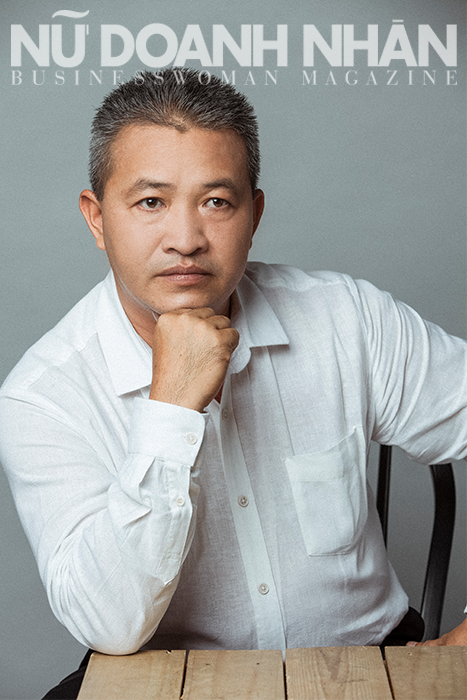Gắn bó hơn 27 năm trong lĩnh vực khách sạn và hiện đảm nhiệm vị trí Tổng Giám đốc Khu nghỉ dưỡng Seahorse Resort & Spa Phan Thiết, Trần Anh Thi được biết đến như một lãnh đạo “đắc nhân tâm” với lý tưởng kiến tạo và đóng góp cho nền du lịch Việt bền vững.
![]()

CLICK HERE OR SCROLL DOWN FOR ENGLISH VERSION |
Chào anh, rất vui được trò chuyện với một vị lãnh đạo gạo cội trong lĩnh vực nhà hàng khách sạn của khu vực miền Trung & Nam Trung Bộ. Theo những trải nghiệm của anh trong thời gian qua, anh đánh giá như thế nào về sự phát triển của ngành du lịch Việt Nam?
Tôi đã gắn bó với ngành du lịch, ngành mến khách về lĩnh vực khách sạn và nhà hàng trong nhiều năm và cũng từng đi qua nhiều miền đất như Đà Lạt, Mũi Né, Hội An, Nha Trang…, những địa điểm vàng trên bản đồ du lịch Việt. Cùng đồng hành với sự phát triển của ngành và qua nhiều trải nghiệm thực tế, tôi nhận thấy đang có rất nhiều cơ hội cho ngành Du lịch và song song đó không thiếu những thách thức. Bên cạnh chất lượng dịch vụ, những yếu tố quyết định sự hài lòng của du khách và đưa họ trở thành khách hàng trung thành bao gồm: sự hiếu khách, chu đáo và tận tình của nhân viên; sự thân thiện của người dân địa phương; cảnh quan du lịch tự nhiên. Tại Seahorse Resort & Spa, ngoài thế mạnh về vị trí ở ngay trung tâm của “thủ đô resort” Phan Thiết, chúng tôi luôn đặt sự hài lòng của du khách làm nền móng phát triển dựa trên văn hóa kinh doanh “tiếp đón du khách như người thân về thăm nhà”. Đây là những điểm mạnh mà Seahorse Resort & Spa đang sở hữu.
Và ở Việt Nam hiện nay, tôi nhìn thấy sự chuyển mình tích cực của trào lưu du lịch hướng nhiều đến nhu cầu khám phá, nghỉ ngơi và hưởng thụ. Điều này đã và đang trở thành động lực khiến ngành du lịch hay mến khách phải không ngừng tiến hóa, hoàn thiện và chất lượng hơn để cung cấp được nhiều dịch vụ ngoài sự mong đợi cho du khách.

Vậy thì các doanh nghiệp trong ngành này cần tiến hóa như thế nào? Và đâu là những tiêu chí quyết định sự sống còn của doanh nghiệp?
Câu hỏi này khiến tôi nhớ đến bài học tâm đắc mà tôi đã rút ra từ cuộc họp với Bộ Văn hóa Thể thao & Du lịch cùng lãnh đạo tỉnh và hơn 80 đại biểu đến từ các khu nghỉ mà tôi được tham dự đầu năm 2013. Tại cuộc họp, tất cả đều thống nhất tiêu chí để phát triển du lịch biển Việt Nam bền vững là 3 chữ S: Sea, Sun và Sand, có nghĩa là Biển xanh, Cát trắng và Nắng vàng. Thấy tôi vẫn đăm chiêu, một vị đã hỏi “tại sao?” và tôi trả lời rằng: “3 chữ S ấy tuy hay nhưng chưa đầy đủ, bởi chúng chỉ nhắc đến những sản phẩm hữu hình do thiên nhiên ban tặng. Còn với Du lịch, một ngành liên quan đến văn hóa và con người, chắc chắn không thể nào bỏ qua chữ S thứ tư là Soul, là tâm hồn của người Việt.” Từ chữ S này, tôi cho rằng tiêu chí quan trọng nhất của ngành Du lịch phải là con người, vì những sản phẩm của ngành phần lớn là sản phẩm vô hình, phải được kết hợp cùng lòng đam mê, tư duy và sáng tạo mới có thể tạo thêm được nhiều sản phẩm vượt mong đợi của du khách.
Riêng đối với doanh nghiệp trong ngành, theo tôi những tiêu chí quan trọng cần xây dựng để tạo nên sự khác biệt, một là phải hiểu rõ về ngành mến khách, xem khách lưu trú như người thân về thăm nhà; hai là phải tìm được sự đồng thuận và tinh thần đoàn kết cao trong đội ngũ nhân viên; ba là khuyến khích trách nhiệm cá nhân và trao quyền hành vào tay những người đang trực tiếp là việc.

Anh đã áp dụng điều này tại nơi mình làm việc như thế nào?
Ở Seahorse Resort & Spa, điều phải-làm đầu tiên của tôi là đảm bảo nguồn thu nhập ổn định cho nhân viên và tăng cường chế độ phúc lợi xã hội. Quan trọng hơn, phải làm cho họ hiểu rằng chính khách hàng là người mang đến cuộc sống ổn định cho họ, từ đó nhân viên sẽ ý thức được việc mình đang làm, biết chú trọng vào cung cách phục vụ và có sáng kiến hay để giữ chân du khách. Ngoài ăn ngon, ngủ êm, thì phải tạo cơ hội cho du khách khám phá văn hóa bản địa, như khám phá những món ăn địa phương chẳng hạn.
Một ví dụ tại Seahorse Resort & Spa, du khách có thể thưởng thức món Lẩu Thả, một món ăn mà qua đó có thể khám phá được những triết lý sâu sắc về ý nghĩa của ẩm thực Việt dựa trên 5 yếu tố: kim, mộc, thủy, hỏa, thổ. Tương ứng là 5 loại gia vị được sử dụng trong món là: cay, chua, đắng, mặn, ngọt. Ngoài ra, món ăn cũng phải được chuẩn bị sao cho thu hút và đánh thức được 5 giác quan của thực khách, từ 5 màu sắc: trắng, xanh lá, vàng, đỏ và đen được trình bày hài hòa, đến hương vị dễ chịu. Và đây là cách mà đầu bếp của chúng tôi xây dựng một triết lý ẩm thực mới.
Song song đó, việc tăng cường đào tạo cung cách phục vụ cho nhân viên sẽ giúp xây dựng nên những con người vừa chuyên nghiệp, vừa hiếu khách cho doanh nghiệp. Từ đó, du khách khi đến nghỉ ngơi sẽ luôn có cảm giác thoải mái và gắn kết không chỉ với những cảnh vật mà là con người ở khu nghỉ dưỡng. Đấy là những điều tôi đã, đang và tiếp tục thực hiện.
BẤM VÀO ĐÂY ĐỂ ĐỌC PHIÊN BẢN BÁO IN |
Bên cạnh việc đưa yếu tố con người vào trong sản phẩm dịch vụ, đâu là các tiêu chí quan trọng khác thúc đẩy sự phát triển và khẳng định vị thế riêng cho doanh nghiệp trong lĩnh vực du lịch và lưu trú?
Đầu tiên, bạn cần tạo nên được sản phẩm hữu hình tốt. Nếu đó là dịch vụ lưu trú thì chỗ ở phải tiện nghi, thoải mái và an toàn. Tiếp đến, phải chú ý đến những yếu tố “vô hình”, vì từ yếu tố này sẽ tác động rất lớn đến sự yêu thích, đam mê của du khách. Du lịch gắn bó với trải nghiệm, gắn bó với cảm hứng sống và cả cảm xúc. Khi tạo ra sản phẩm có thể mang đến 3 điều ấy cho du khách thì có nghĩa bạn đã thành công.
Để làm được điều này, đứng ở vị trí lãnh đạo, bạn không thể tự mình làm hết mọi việc, bạn cần trao niềm tin và trách nhiệm để gắn kết từng cá thể trong doanh nghiệp nơi mình làm việc. Hiện nay, rất nhiều hoạt động đầu tư du lịch của người Việt mang yếu tố sinh lợi ngắn hạn và hời hợt mà thiếu đi sự tư vấn để dài hạn hơn. Trong khi đó, các tập đoàn hoặc thương hiệu nước ngoài làm du lịch tại Việt Nam thì ngược lại, họ xây dựng dịch vụ và chiến lược theo hướng bền vững. Và đó là điều chúng ta cần học hỏi.

Theo đánh giá của anh, sắp tới ngành du lịch sẽ có những biến chuyển thế nào? Và anh đã chuẩn bị gì để ứng phó?
Trong thời gian tới, Du lịch sẽ trở thành ngành dịch vụ theo xu hướng tiêu dùng và khách hàng là người quyết định. Cũng như các lĩnh vực kinh doanh khác, công nghệ kỹ thuật số đang tác động mạnh mẽ đến khách hàng và khách du lịch sẽ ngày càng đòi hỏi nhiều dịch vụ phù hợp với nhu cầu riêng của họ. Từ năm 2004 đến nay, khi Du lịch được xác định là ngành kinh tế mũi nhọn thì lượng du khách nội địa cũng như khách nước ngoài đến Việt Nam gia tăng đáng kể. Để chuẩn bị cho những thay đổi trong ngành này, doanh nghiệp cần có nhiều phương án mới để tiếp cận khách hàng, duy trì và đào tạo nguồn nhân lực phù hợp để thích nghi với biến động thị trường. Và điều tôi cố gắng để tất cả nhân viên đều có, ngoài tiền lương mỗi tháng, là niềm đam mê. Vì trong ngành này, chỉ có niềm đam mê mới tạo ra được những dịch vụ hoàn hảo.
Làm trong lĩnh vực được tiếp xúc với nhiều người, hẳn anh có cơ hội làm việc với rất nhiều nữ doanh nhân và nữ lãnh đạo? Ai là người tạo cho anh ấn tượng nhất và vì lẽ gì?
Trong ngành Du lịch, quả thật nữ giới có phần “áp đảo” nam giới chúng tôi (cười). Phụ nữ thật sự có những điểm mạnh mà nam giới nên học hỏi như sự mềm mỏng, linh hoạt trong suy nghĩ và tinh tế khi giao tiếp với khách hàng và đối tác. Và người mà cho tôi ấn tượng nhất từ trước đến nay cũng là một nữ doanh nhân, người đứng đầu công ty chủ quản của Seahorse Resort & Spa, bà Lê Thị Hằng Nga. Chị là hình mẫu tiêu biểu của sự kết hợp hài hòa giữa nét đẹp “công-dung-ngôn-hạnh” của phụ nữ Á Đông và cá tính “hiện đại”.
Bài viết và hình ảnh độc quyền của Tạp chí Nữ Doanh Nhân.
![]()
TRAVELING IS NECESSARY FOR A QUALITY LIFE
With over 27 years of service in the field of hotel services and his current position as CEO of the Seahorse Resort & Spa Phan Thiet, Trần Anh Thi is renowned for his charismatic leadership as well as being part of a collaborative and constructive ideology for a sustainable tourism industry in Vietnam.

Greetings, it’s such a pleasure to sit down with an eminent figure in the field of hospitality across the Central and Mid-Southern regions of Vietnam. Based on your experience over the years, what do you make of the development of Vietnamese tourism?
I have, indeed, committed myself to the tourism and hospitality industry, particularly in the field of hotels and restaurants for several years. Thus, I have set foot upon plenty of golden tourist destinations across the country, such as Dalat, Mui Ne, Hoi An, Nha Trang, and so on. Having observed the growth of this industry with my own eyes, I reckon that it is facing both huge opportunities and formidable challenges. There’s more to satisfying tourists and gaining their loyalty than mere service quality: The hospitality and sincerity of the staff; the openness and welcoming nature of the locals; and of course the beautiful natural scenery. At the Seahorse Resort & Spa, aside from our advantage of having a prime location, we also maintain guest satisfaction as the bottom line of our development, based on the business culture of “welcoming your guests as if they’re family”.
Currently in Vietnam, I’ve observed a positive turn in travel trends that focuses more on discovery, relaxation and indulgence. This has always been and is now becoming the motivation for the tourism and hospitality industry to relentlessly transform and improve itself, in order to offer more and more services beyond the quality expectations of tourists.
So how do they need to transform themselves? And which criteria, in your opinion, are essential for the survival of a business in the hospitality industry?
This question actually reminds me of a valuable lesson I managed to draw from a meeting with the Ministry of Culture, Sports and Tourism, provincial officials and over 80 delegates from other resorts back in early 2013. At that meeting, a consensus was reached regarding the criteria of a sustainable development of Vietnamese coastal tourism. The focus was on the 3 Ss: Sea, Sun and Sand. Still, I wasn’t satisfied with the proposal, and when asked about it, I replied: “These 3Ss are good, but not good enough because they only focus on the gifts provided to us by Mother Nature, while the tourism industry itself deals more with the culture and people. It is, therefore, a mistake to overlook the fourth S, which is Soul. The very soul of the Vietnamese.”
In light of this new S, I believe that the most crucial element in the tourism industry is human beings, whose passion, brilliance and creativity are the key ingredients in transforming typically intangible products into those beyond the expectations for quality.
As for individual businesses in the industry, there are a few important criteria to focus on if you are going to make a difference. One: Understand the hospitality industry inside out, treating your guests as if they’re your family. Two: Attain a consensus and bolster morale within your team. And three: Encourage individual responsibility and entrust power to those who are directly handling the work.
How have you applied these at your workplace?
At the Seahorse Resort & Spa, my first and foremost duty is to secure a stable income for my staff and improve their social welfare. More importantly, they must be made aware that their guests are actually contributing to the quality of their lives, which makes them become more thoughtful in their duties, paying more attention to the way they serve them and coming up with amazing ideas to retain these guests. Besides fine dining and a cozy bed, tourists also enjoy learning about the local culture, like trying the local dishes for instance.
An example of this notion at the Seahorse Resort & Spa is that our guests can enjoy the Thả Hotpot, a dish that offers more insight into Vietnamese culinary philosophy, based on these five elements: Metal, wood, water, fire, and earth. These five elements are represented by five distinct tastes: Spicy, sour, bitter, savoury and sweet and five different colours displayed on the dish: White, green, yellow, red and black.
At the same time, intensive service training was designed to introduce a more professional and hospitable staff for the company. Therefore, tourists who come here will always enjoy the comfortable ambiance and the connection with not only the scenery, but also the people at the resort. That is what I have done and will keep on doing.
***
“It’s also true that our female counterparts have many strengths that are worth learning from, such as tenderness and flexibility in thinking as well as using subtlety in communication with customers and partners.”
***
Apart from the introduction of the human element in the service sector, what are the other important criteria for a business to develop and elevate its position in the field of tourism and maintain it?
First and foremost, you need to create a decent tangible product. Like convenient, comfortable and secure accommodation, for instance. Then come the “invisible” elements, which have a great influence on the satisfaction of the guests. Traveling comes hand in hand with experience, inspiration from life in general and even emotions. Being able to offer a product that comprises these three elements means success.
In order to pull this off as a leader, you simply can’t do it all. But you can learn to place faith and responsibility in your staff, and connect with each and every individual at the workplace. At the moment, there has been a rise in Vietnamese-based tourism investment, but they mainly concentrate onshort-term profits and lack the consultation needed to take further, long-term steps. Meanwhile, foreign tourism corporations and brands in Vietnam are doing the opposite, building up sustainable services and strategies. That is what we need to learn from them.
Based on your judgment, what kind of fluctuations is the tourism industry expecting in the coming years? And what have you done in preparation for them?
In the time to come, tourism will become a consumer industry where customers make the decisions. And just as with any other business fields, digital technology is having a strong influence on tourists, leading them to demand more and more services that suit their personal needs. Since tourism was determined to be a focal economic industry of the country back in 2004, it has seen a remarkable rise in the number of both domestic and foreign tourists visiting Vietnam. In preparation for the changes in this field, a business must come up with new ideas to approach its customers, and maintain and develop its human resources to cope with market fluctuations. What I always struggle to achieve is that apart from their monthly salary, my staff manage to nourish their passion. Because in this field, passion is what’s needed to provide perfect service.
Working in a field that entails intense contact with people, you must have many opportunities to deal with businesswomen and female leaders. Which one of them has had the strongest impression on you and why?
It is true that women considerably “outnumber” us men in the tourism industry (grinning). It’s also true that our female counterparts have many strengths that are worth learning from, such as the tenderness and flexibility in thinking as well as using subtlety in communication with customers and partners. And one woman that has made a profound impression on me is also a businesswoman, the head of the Seahorse Resort & Spa mother company, Mrs. Lê Thị Hằng Nga. She is an exemplary model of the harmonious blend between the “Four Virtues” of beauty for an Asian woman as well as having “modern” characteristics.
Copyright © 2017 All Rights Reserved
![]()
Có thể bạn quan tâm:
GĐ, Yves Rocher VN, Pieter Claudel: Bởi tôi luôn quan tâm đến phái đẹp đấy mà!


